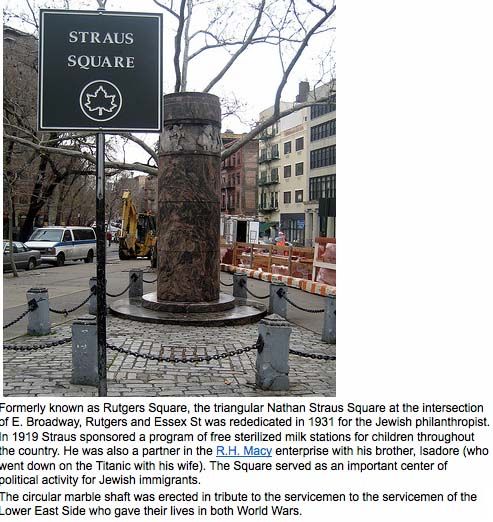
photo above from wallg on flickr
biography below from the jewish virtual library
The American most responsible for ensuring a safe milk supply throughout the nation's cities was not a physician, scientist or politician, but a department store magnate. In 1923, Nathan Straus' battle against unsanitary milk, which he termed “the white peril,” won him the accolade “most useful citizen in New York.”
Born in Bavaria in 1848, Nathan Straus came to Georgia with his mother, brothers and sister in 1854. The Strauses moved to New York City after the Civil War, where Nathan and his older brother Isidore became the sole owners and managing directors of the R. H. Macy department store. In 1914, deeply affected by the loss of Isidore and his wife, both of whom perished on the Titanic, Nathan retired from business to devote himself full-time to public service and philanthropy.
Nathan's career in public service began earlier, in 1889, when he was appointed New York City's parks commissioner. In 1894, he received the Democratic Party's nomination for mayor of New York, an honor he declined. Three years later he was named president of the New York City Board of Health. During the 1890s, Straus became especially concerned with the plight of New York's tenement dwellers. During the terrible depression winters of 1892 and 1893, he operated a chain of centers to distribute food and coal to the poor and he built shelters for the homeless. However, his main concern was the high mortality of infants and children that, he became convinced, was caused chiefly by their consumption of unsanitary raw milk.
Straus was sensitized to child mortality by the deaths of two of his three children. Straus claimed that it was the sudden death of his own cow that first drew his attention to the relationship between raw milk and child mortality. After an autopsy revealed that the animal had tuberculosis, Straus worried that the animal might have passed the disease along to his family. Doctors, scientists and social reformers had long denounced the poor quality of milk available in the nation's cities, especially during the summer, and they blamed bad milk for the deaths of hundreds of thousands of American children. Straus saw a need to act.
Straus was convinced that the discoveries of Louis Pasteur offered the best hope for a remedy to the milk problem. He built his own plant to sterilize milk bottles and pasteurize (that is, heat) milk to kill bacteria. In 1893, at his own expense Straus opened the first of 18 milk distribution depots throughout the city, which sold his sterilized milk for only a few cents and made free milk available to those unable to afford even that.
Straus believed that ensuring safe milk should be a government responsibility. He tirelessly lectured civic groups and bombarded political leaders around the United States with missives describing the menace of raw milk. He carried the campaign abroad by building pasteurization plants in Europe and the Middle East to demonstrate the technique to foreign governments.
Farmers and commercial milk distributors unwilling to undertake the expense of pasteurization opposed Straus' campaign, which he waged together with his wife Una. Some scientists suspicious of “new-fangled” ideas and politicians reluctant to see government conduct social “experiments” also resisted Straus' campaign. His views took hold as statistics showed that infant mortality rates in the areas around his milk depots dropped precipitously. In Manhattan and the Bronx alone, Straus was credited with saving the lives of thousands of children. Considering the mortality rates in other cities that adopted his methods, the effects reached millions of children. By the early 20th century, cities and states began requiring milk pasteurization and in the 1920s Congress enacted national milk health regulations. In 1920, Straus donated his pasteurization plant to the city of New York and turned the milk depots over to public agencies.
The milk fight won, Nathan and Una devoted the last decade of their lives to Zionist activities and promoting Jewish life in America. They helped underwrite the first nursing missions sent to the Holy Land by Hadassah and funded pasteurization plants, hospitals and other facilities in Jerusalem and Tel Aviv. The Strauses ultimately gave nearly two thirds of their wealth to improve living conditions for Arabs and Jews in Palestine. Nathan also helped found the American Jewish Congress, and in 1917 launched the Jewish War Relief Fund with the largest single financial contribution.
In 1923, Nathan Straus won an opinion poll asking New Yorkers to name the individual who had done the most to promote the city's public wel-fare during the previous quarter century. Said one admirer, Straus was “a star in the milky way of philanthropy, a man whose heart is bubbling over with the sterilized milk of human kindness.”

No comments:
Post a Comment